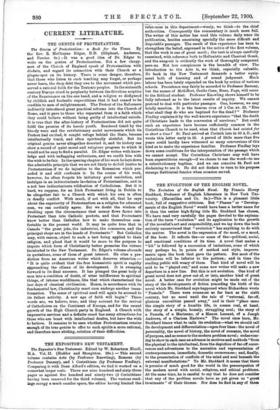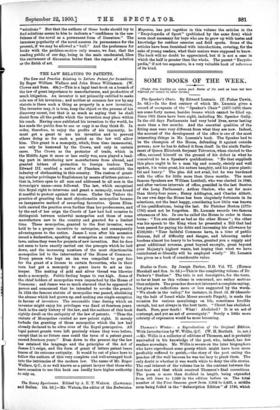THE EVOLUTION OF THE ENGLISH NOVEL.
The Evolution of the English Novel. By Francis Hovey Stoddard, Professor of English Literature in New York Uni- versity. (Macmillan and Co. 6s.)—This is a pleasant little book, full of suggestive criticism. But " Phases " or "Develop- ments of the English Novel" would have been a better name for it than the rather high-flying title Mr. Stoddard has chosen. We have read very carefully the pages devoted to the explana- tion of the term " evolution " and its application to the growth of the novelist's art and responsibility, and we lay down the book entirely unconvinced that " evolution " has anything to do with the matter. The novel is the expression of the mood, or a mood, of the hour. It reflects the—or some of the—political, social, and emotional conditions of its time. A novel that makes a "hit" is followed by a succession of imitations, some of which may perhaps be, in points of method and style, improve- ments upon the book that gave the pattern. But most of the imitations will be inferior to the pattern; and in time the reading public will weary of them. That kind of novel will be said to be "played out," and some new writer will make a new departure in a new line. But this is not evolution. One kind of great novel does not grow out of, or into, another kind of great novel. A better case for evolution might be made out of the story of the developments of fiction preceding the birth of the novel which Mr. Stoddard says happened when Richardson wrote "Pamela." There were romances as far back as the sixth century, but no novel until the tale of "external, far-off, glorious unrealities passed away," and in their "place came the simple story of a humble life, in scenes real, at hand, the story of a simple, homely, struggling soul; the story of a Pamela, of a Marianne, of a Manon Lescaut, of a Joseph Andrews, of a Clarissa Harlowe." The novel once born, Mr. Stoddard traces what he calls its evolution—what we should call its development and differentiation—upon four lines : the novel of personality, the novel of history, the novel of romance, the novel of purpose, and so comes to the modern problem novel; endeavour- ing to show in each case an advance in motives and methods "from the physical to the intellectual, from the depiction of far-off occur- rences and adventures to the narration and representation of contemporaneous, immediate, domestic occurrences ; and, finally, to the presentation of conflicts of the mind and soul beneath the external manifestations." To Mr. Stoddard it seems that there is promise of much good for the world in the preoccupation of the modern novel with social, religions, and ethical problems, At the same time, he is careful to say that he does not consider that any of the problem novels have as yet given us 'great treatments" of their themes. Nor does he find in any of them
"solutions" But that the authors of these books should try to find solutions seems to him to indicate a " confidence in the use- fulness of the novel as a permanent form of literature." The immense popularity of the novel assures its permanence for the present, if we may be allowed a "bull." And the preference for books with the problem-motive only means, we fear, that the reading public of our day, being in the main uneducated, likes the excitement of discussion better than the repose of solution or the finish of art.







































 Previous page
Previous page